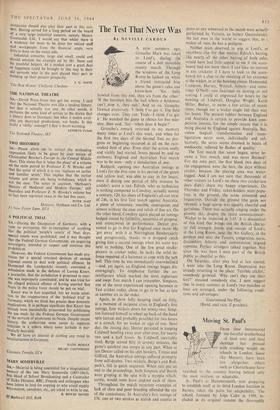A POLITICAL TRIAL
Sta,—During the Occupation of Germany, with a view to preventing the re-emergence of anything like the political 'people's courts' of Nazi days, special courts were prohibited; and it was thought that the Federal German Government, on acquiring sovereignty, intended to respect and continue this prohibition.
However, the Federal Government has made pro- vision for a special criminal division of certain regional courts to deal with political offences. In Dortmund the Landgericht -recently overruled a submission made in the defence of Lorenz Knorr, a journalist, that the jurisdiction it proposed to exer- cise was improperly constituted; and he was tried for the alleged political offence of having asserted that Nazis in the police force should be put on trial.
Knorr was in fact acquitted, but we invite atten- tion to the reappearance of the 'political trial' in Germany, which we think has greater than domestic implications. It is perhaps significant that Knorr has already been successfully prosecuted for publicising the use made by the Federal German Government of the services of prominent ex-Nazis. Despite recent history, the authorities seem astute to suppress criticism in a sphere where some latitude is par- ticularly desirable.
We all have an interest in curbing any trend to totalitarianism in Germany.
Cloisters, Temple, EC4
KEITH MCHALE
HILARY CARTWRIGHT


































 Previous page
Previous page